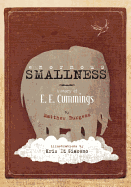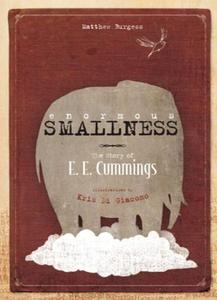

The "enormous smallness" of the title stems from Cummings's experience as a small child encountering Nature's "illimitable being." Kris Di Giacomo's (My Dad Is Big and Strong) opening scene, in a spumoni ice cream–colored palette, shows a snapshot of the street framed by trees. She spotlights a bird on a branch, its song a flurry of floating letters. This is 4 Patchin Place in New York City, Cummings's home for nearly 40 years. "Peek inside and you will see/ the room where E.E. writes his poetry." The poet leans out of the window to witness the birdsong, just as he did as a boy in Di Giacomo's later images of his boyhood.
Downstairs, "the love of E.E.'s life," Marion Moorehouse, calls him to tea by ringing "an elephant/ with a bell in its belly." Several pages later, readers learn of the fascination young Estlin develops after seeing elephants at the circus and zoo. The bell beckons Cummings away from his typewriter, where he's composed the first stanza of "53": "may my heart always be open to little/ birds who are the secrets of living/ whatever they sing is better than to know/ and if men should not hear them men are old." Di Giacomo shows the lines entering Cummings as birdsong and he, as conduit, translates them onto the page. Burgess tells the poet's story through internal rhymes and wordplay characteristic of Cummings, while Di Giacomo's visual motif of birds and elephants appears on nearly every page.
The author includes major life events and poems, always circling back to a playfulness born in the poet's childhood and carried through his entire life, nurtured by parents and teachers. What makes this such a successful children's book is the author and artist's focus on Cummings's ability to channel and hold onto the inventiveness of childhood. In the closing poem, published after Cummings's death, he recalls himself as a boy: "who are you,little i/ (five or six years old)/ peering from some high/ window;at the gold/ of November sunset/ (and feeling:that if day/ has to become night/ this is a beautiful way)." Di Giacomo portrays the poet as a silhouette outline of his beloved birds, juxtaposed with his child-self at the window in a golden color that matches the clouds. He leaves the world with his heart still open "to little/ birds who are the secrets of living." --Jennifer M. Brown, children's editor, Shelf Awareness
Shelf Talker: This biography of E.E. Cummings, a favorite poet among children, demonstrates through words and pictures the importance of an open heart and a sense of wonder.

